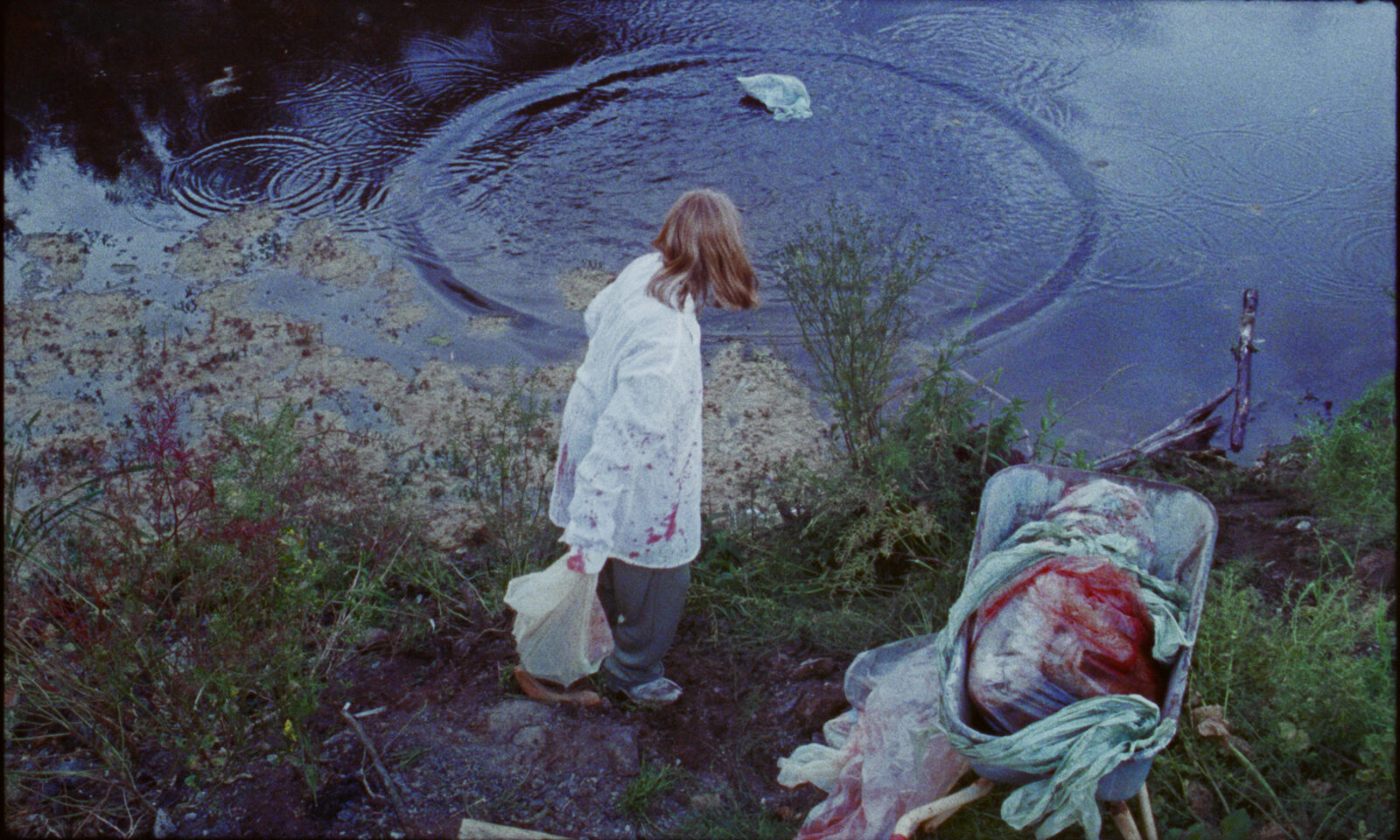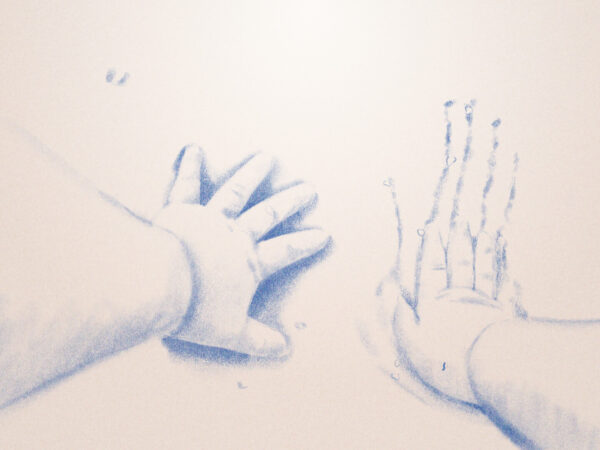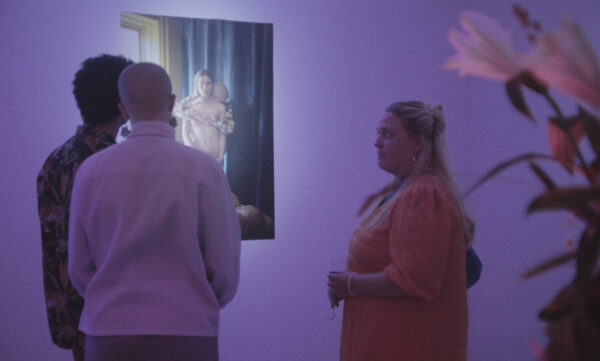Bare To The Bone
Inherent
Nicolai G.H Johansen’s horror-thriller investigates the roots of fear and anxiety—the one associated with a first love, a first touch, a first time of carelessly crossing a boundary towards the Other.

Danish director Nicolai G.H Johansen has always had a knack for the outliers and, by extension, the eeriness of strangerhood. Instead of undertaking a more conventional approach at criticising existent social structures responsible for inequality and hierarchies, Johansen uses the essence of cinema (sound, image, mood) to dive deep into isolated stories. By choosing depth of emotion over breadth of context, the filmmaker has put himself on the map of breakthrough European auteurs working in–I hope this doesn’t surprise you genre short form. Horror/thriller seems to be the code of choice, but in truth, its dimensions are moldable and thus, often coalesce into an atmosphere that is palpable and tense. Loners thrive in the vehemence of such conditions, and Johansen’s artistic drive in revealing the darker inner workings of the human psyche reaches its most secluded corners.
His latest short, Inherent, playing as part of the International Competition of Filmfest Dresden opens with an ominous long shot of a bird pecking at another dead bird. As the camera slowly tracks forward, pulled by the gravitational force of centerstage cannibalism, the bird shows only disregard for the hungry camera-eye. However, once lured in, the look can only grow more focused – the long shot reduced to a close-up now – allowing the viewer to marvel at the dead’s magnificently spread wings and the closeness between the eater and the one being eaten; an intimacy which is uncompromisingly final and, somehow, absolute. Renditions of similar intimacy resurface in the minimal plot of Inherent, while the film suggests that every act of closeness is perhaps cannibalistic in its intent. Yet we all seek it, often at all costs.
The first time we meet Girl, the film’s protagonist, played by Sandra Guldberg Kampp known from Jeanette Nordahl’s 2020 film Wildland, she is looking at a family playing minigolf. However, the longing inscribed in her engrossed look has little to do with familial bonds. Rather, her attention is drawn to Boy, potrayed by Noah Skovgaard Skands, whose absentmindedness soon enters her dreams. Johansen results to fragments of storytelling and his economical decision brings a particular kind of intensity to a burgeoning love story. The urgency with which Girl desires Boy is immediate and scintillating – nothing more to be said, nor explained: Girl meets Boy, tale as old as time. Kampp’s troubled determination pierces through the diegetic space and her look is so savagely fixated that the camera cannot help but follow. Female subjectivity, as seen in Inherent, can be primal and still retain multitudes of expressionistic force. It is not surprising, then, that Johansen names Claire Denis’ Trouble Every Day (2001) as his main inspiration here.
In a film that completely excludes dialogue, other avenues have to be explored. Slowly, the audience learns more of Girl’s everyday routines and does so in snippets of repetitive acts and gestures: disposing of remains in a lake, attending a tank full of blood, slicing blood-filled plastic bags open, to then ‘feed’ a mysterious presence in the attic. A derelict house in the middle of nowhere fosters this teenage girl and her sanguinary duty, a home that barely remembers its better days. Shots of a single mattress laid bare on a dusty floor, broken-down curtain panels, paper wrappers covering the floor are paired with closer attention to the faded-out floral wallpapers that still retain the memory of something opulent. Gothic horror tropes covered under layers of dust; the long empty corridors echo and reverb as Girl tends to a demanding blood-thirsty presence. The film’s central figure remains a mystery and for good measure; this way Inherent preserves its core ambiguity—a concept requisite for both desire and fear.
Johansen notably built this unknown presence together with sound designer Asger Midjord Rasmussen only in post-production since the figure is not granted any other materiality than that of sound. In order to conjure an existence which is both tactile and frail, they inserted sounds by the likes of an unsettling wheezing, and the struggle for breath, even heard in the distance, encapsulates both weakness and encroaching danger. This way, the blood we see dripping down Girl’s chin as she takes a gulp, or the way it splatters when she knifes the plastic bags, is not the horror endgame. It is in the interplay between sound and (lack of) image that potent horror tropes gain their otherworldly power. Even if we read the film as an allegory for the taboo of menstruation and its complex relation with female desire, the repressed rule-giving presence in the attic remains its central ‘villain’.
Ellipsis holds power, and the film’s succinct use of editing affirms it with ease: from a look exchanged between Girl and Boy, the following jump cut sees them riding off together, to the sunset, if it was a fairytale. But Inherent is decisively not one. The complexity of sexual appetites and the craving for shared intimacy intertwine in a rather deadly knot when the physical distance is bridged. Touch is already a stake, inviting someone in is an immense risk, ethically speaking. And while vampire and werewolf tropes often forbid that very act of touching, as it would be revelatory and dangerous, fairytales regulate the private and the public space, maintaining their limits through initiation rituals. Here, Boy’s trespassing into his almost-lover’s house reminds us of a gender-reversal of “Bluebeard” but the film withholds its ‘ever-after’.
Inherent investigates the roots of fear and anxiety, but not just any kind–the one associated with a first love, a first touch, a first time of carelessly crossing a boundary towards the Other. Until the very end, Girl seems unaware of her own bodily existence: she lets bruises bleed, her clothes shrivel with blood stains, and the bandages that help her skin heal seem to always be in the process of falling apart. Yet, her surrender is unquestioned, both to the anonymous governing presence in the attic, and to the pull of desire. The fact that the film is deprived of any dialogue at all, also corresponds with the ineffable essence of love and yearning. Somehow, in the quietude, their demands resonate even louder. In a way, love always entails trespassing, even if we are culturally conditioned to think of intimacy as an antidote to danger. In Inherent, they are given the space to dance their deadly tango, all the while affirming that love is an act of absolute bravery, to love and to be loved in return.





There are no comments yet, be the first!